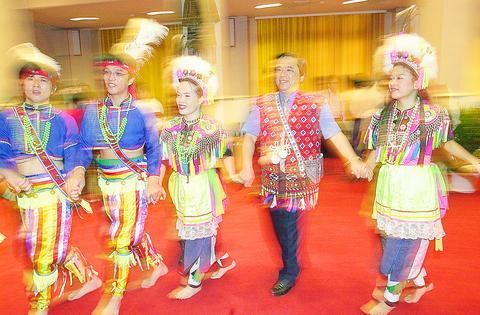The Executive Yuan yesterday passed a draft bill on the establishment of the Aboriginal autonomous region, but Aboriginal lawmakers expressed lukewarm opinions over the government initiative.
According to the statute on the establishment of the Aboriginal autonomous region, each the nation's 11 Aboriginal tribes would be able to set up a tribal council of their own to be in charge of the establishment of their own autonomous region.

PHOTO: CHANG CHIA-MING, TAIPEI TIMES
Different Aboriginal tribes could also jointly set up a single autonomous region and one single tribe could set up more than two or more autonomous regions.
The autonomous region would have its own law, land ownership, political structure, economic system, society and culture.
The central government would be able provide financial assistance to those autonomous regions with financial difficulties.
Should there be any disputes between the regions, the central government and the autonomous region or regions in dispute could ask the Legislative Yuan to mediate.
Autonomous regions having disputes could also turn to the Executive Yuan for intervention.
Praising the draft as an important milestone in the government's respect of a multi-ethnic society, Premier Yu Shyi-kun said that the approval of the draft marks one giant step toward the realization of President Chen Shui-bian's (
On Sept. 10, 1999, Chen signed an agreement with Aboriginal tribes in which he pledged to promote an autonomous region for Aborigines and push for other native rights -- such giving them a say in the use of natural resources, land ownership and the resumption of using the original ethnic names of Aboriginal tribes, rivers and mountains.
Describing the draft as "vague," Aboriginal Legislator May Chin (
"I wouldn't call myself an indigenous person if I supported the draft," she said, adding that she and other independent lawmakers would propose their own version of the bill.
Chin said the Cabinet's approval of the draft was done merely to curry political favor.
"If President Chen really wants to make good on his promise, he should've presented the beef instead of just the menu in which the chef cannot even cook up the order," she said.
Aboriginal Legislator Walis-Pelin (瓦歷斯貝林), convener of the legislature's independent alliance, said that although he recognized the government's efforts to approve such a draft, there is still room for improvement.
"Aborigines should have had the right to self govern themselves long time ago," he said.
"Aborigines might be able to preserve their own cultures, languages and traditions, but the draft fails to specifically regulate such controversial issues as land ownership, resources use," Walis-Pelin said.
He also said that he would not support the Cabinet's version in the legislature.
"In the version of the independent alliance, Aborigines should enjoy a high degree of autonomy and the administrative status of the Aboriginal autonomous region should be on a par with that of the Executive Yuan," he said.

‘DENIAL DEFENSE’: The US would increase its military presence with uncrewed ships, and submarines, while boosting defense in the Indo-Pacific, a Pete Hegseth memo said The US is reorienting its military strategy to focus primarily on deterring a potential Chinese invasion of Taiwan, a memo signed by US Secretary of Defense Pete Hegseth showed. The memo also called on Taiwan to increase its defense spending. The document, known as the “Interim National Defense Strategic Guidance,” was distributed this month and detailed the national defense plans of US President Donald Trump’s administration, an article in the Washington Post said on Saturday. It outlines how the US can prepare for a potential war with China and defend itself from threats in the “near abroad,” including Greenland and the Panama

A wild live dugong was found in Taiwan for the first time in 88 years, after it was accidentally caught by a fisher’s net on Tuesday in Yilan County’s Fenniaolin (粉鳥林). This is the first sighting of the species in Taiwan since 1937, having already been considered “extinct” in the country and considered as “vulnerable” by the International Union for Conservation of Nature. A fisher surnamed Chen (陳) went to Fenniaolin to collect the fish in his netting, but instead caught a 3m long, 500kg dugong. The fisher released the animal back into the wild, not realizing it was an endangered species at

The High Prosecutors’ Office yesterday withdrew an appeal against the acquittal of a former bank manager 22 years after his death, marking Taiwan’s first instance of prosecutors rendering posthumous justice to a wrongfully convicted defendant. Chu Ching-en (諸慶恩) — formerly a manager at the Taipei branch of BNP Paribas — was in 1999 accused by Weng Mao-chung (翁茂鍾), then-president of Chia Her Industrial Co, of forging a request for a fixed deposit of US$10 million by I-Hwa Industrial Co, a subsidiary of Chia Her, which was used as collateral. Chu was ruled not guilty in the first trial, but was found guilty

DEADLOCK: As the commission is unable to forum a quorum to review license renewal applications, the channel operators are not at fault and can air past their license date The National Communications Commission (NCC) yesterday said that the Public Television Service (PTS) and 36 other television and radio broadcasters could continue airing, despite the commission’s inability to meet a quorum to review their license renewal applications. The licenses of PTS and the other channels are set to expire between this month and June. The National Communications Commission Organization Act (國家通訊傳播委員會組織法) stipulates that the commission must meet the mandated quorum of four to hold a valid meeting. The seven-member commission currently has only three commissioners. “We have informed the channel operators of the progress we have made in reviewing their license renewal applications, and